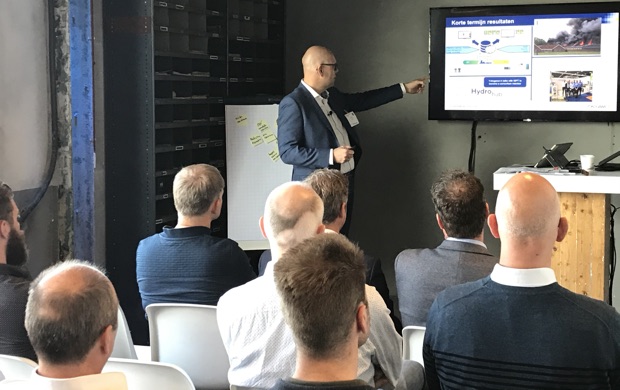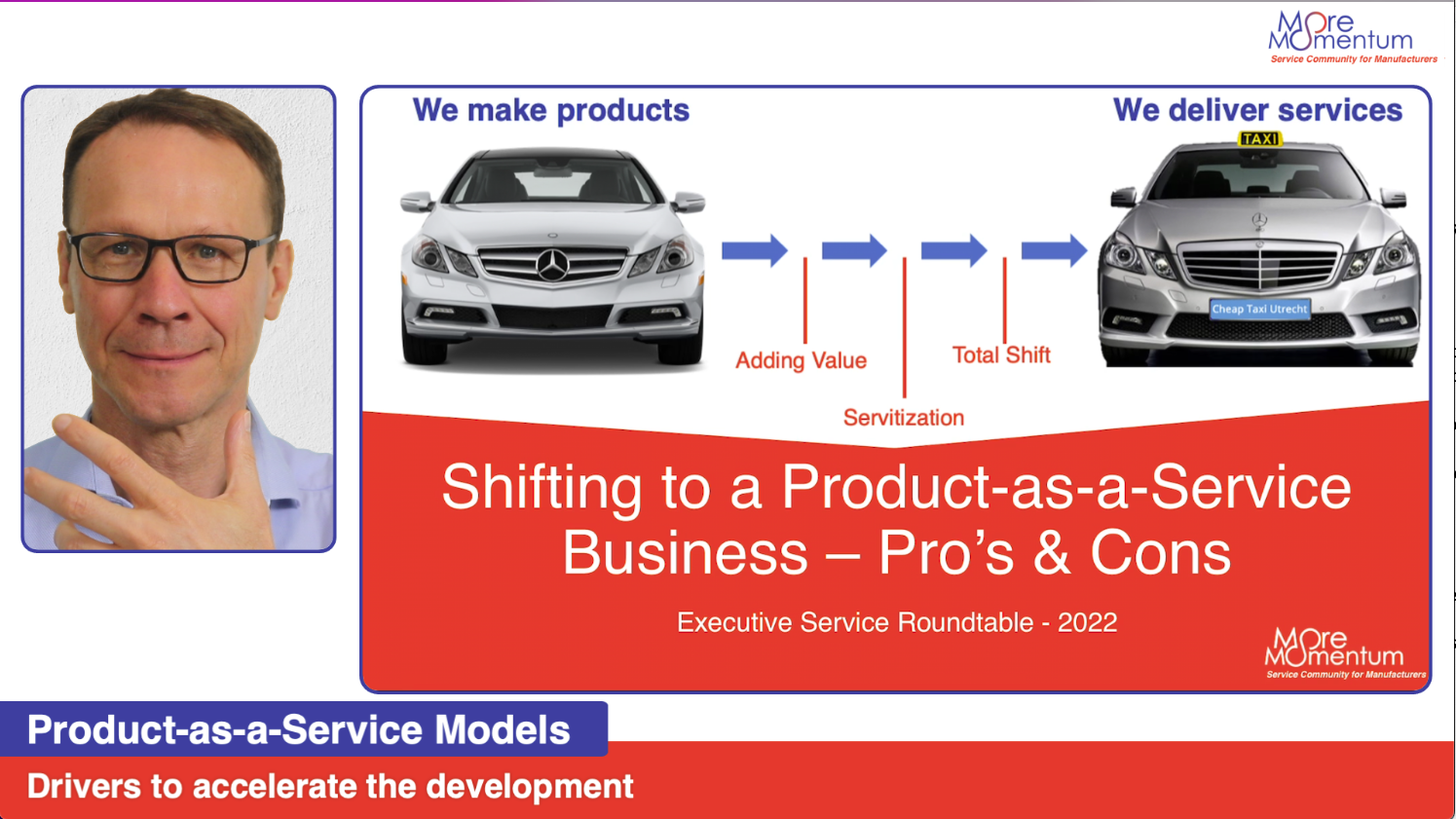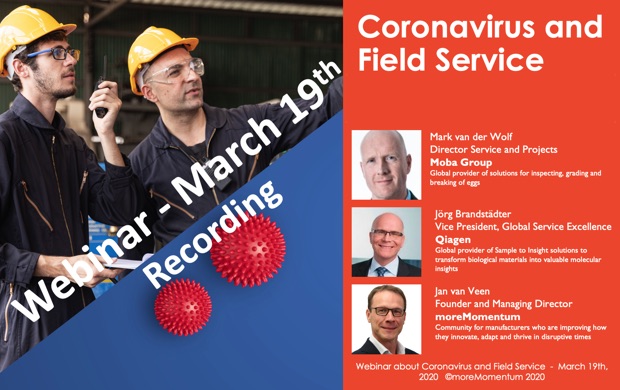Why push Product-as-a-Service models if customers do not see the value?
Why investing in Product-as-a-Service models when it seems hard to convince customers about the value and to pay for these services? There are more...
4 min read
Jan van Veen
Nov 5, 2019 11:52:00 AM

A Masterclass "How to Develop new Service Business Models", by Jan van Veen (moreMomentum), Joris van den Burg (Yokogawa) and Marco Vos (Marel) during the Smart Services & Maintenance 2019 conference of Heliview in the Netherlands.
Any organisation and person is using more and more digital technology and data with pretty much all operations and activities. With this, their challenges and needs are changing as well. For manufactures of equipment and products, this creates a huge opportunity to increase relevance and value for their clients by embracing digital and data features in their value offerings.
It becomes pretty hard to do this without becoming more service-oriented in the value proposition and business model. After all, turning data into value is a service.
For the 2019 Smart Services & Maintenance Conference in the Netherlands – organised by Heliview, we conducted a Masterclass on the topic “Developing New Service Business Models”. Joris van den Burg (Yokogawa) Marco Vos (Marel) and Jan van Veen (moreMomentum) moderated the Masterclass.
During the Masterclass, the moderators shared their experiences and practices as well as their strategies to overcome the obstacles. Based on their presentations, 25 practitioners and the moderators further exchanged practices and challenges. This resulted in actionable insights on the “what” and the “how” of developing new service business models.
Jan van Veen (author and founder of moreMomentum) emphasised that operations of many organisations (clients of manufacturers) are more and more becoming data-driven in how they are being managed and optimised. New digital native service providers and system integrators are excellent in turning data into real value for your clients. So, they become new competitors for manufacturers.
So how can manufacturers increase their value and relevance? He mentioned Caterpillar as an example: Caterpillar goes beyond predictive maintenance or equipment condition to help their clients to improve operational excellence. Their service offerings help to improve the project planning at a construction plant, improving asset utilisation, making sure their clients use the right equipment for the right task at different stages of the project, reducing fuel consumption and what have you.
A poll amongst the participants showed that most of them are aiming for advanced services beyond predictive or condition-based maintenance and maybe even a ‘product as a service’ offering.
A significant challenge for this is to have deep insights in your customers’ challenges, strategies and needs of today and the future. Which are their pain points and struggles, what are their needs for external support? A few reasons why it can be challenging to develop these insights:
Another challenge is how to manage potential cannibalism. New offerings may compete against your current offerings – which after all are the bread and butter of today.
Agile Coach Joris van den Burg shared his recent experiences at Yokogawa. Yokogawa is a provider of innovative Industrial Automation and Test and Measurement solutions. Combining superior technology with engineering services, project management, and maintenance, Yokogawa delivers field-proven operational efficiency, safety, quality, reliability and sustainability. Particularly the latter is a considerable challenge and priority for our industries with a significant environmental footprint.
How to initiate a (service) transition? The first step is to recognise the compelling reason to act, a burning platform. Next is about establishing a shared and clear vision, (the ‘why), after which it is time to prepare leadership, empowerment of the organisation, motivation and communication. Joris decided to establish a pilot with three business accelerator squad-teams. These teams follow an agile method to develop new value propositions and business models in domains like energy-transition, smart sensoring avoiding fires in stables or barns. Working with squad teams and agile methods formed an excellent framework to allow creativity, speed and space for new ideas.
Each squad team and the entire pilot followed an iterative process. After all, not everything is successful from the first attempt. This requires strong leadership and short-term results.
Imagine the squad teams being speedboats and your entire organisation being a huge tanker. How to integrate this speedboat into the ongoing business of the tanker? A few tips:
Service IoT Project Manager and coach Marco Vos shared the journey at Marel. Marel is a leading provider of advanced food processing systems and services for the poultry, meat and fish industry. Marco was involved in IoT-pilots focussing on task-based and real-time data for predictive maintenance.
The food industry is a diverse industry, with conservative and quite advanced players. Many of Marel’s clients are strong in operational control and have little need to transform into a smart factory on short notice.
Marel partnered with one of the advanced clients to jointly learn about the potential impact of IoT within the food industry. For both, it is an exciting challenge to embrace the new digital world. New digital services enter the portfolio of offerings, which have a direct impact on the ongoing business. Marel needs to develop new service processes, develop new revenue streams from these services and hence investigate and establish new business models.
A pilot client was interested in implementing IoT once IoT was linked to performance – higher utilisation and guaranteed productivity and reduced risk.
It was an insightful experience when insights about the performance from customer data appeared to be too offensive for a client. Making your clients successful with new performance information requires guidance and support in analysing and interpreting the data and using the insights to further optimise their processes.
Key is to keep the pilots small and manageable and have the pilot client involved in every aspect.
Subscribe for the our Impulse Letter
With regular updates about service news, trends and best practices.

Why investing in Product-as-a-Service models when it seems hard to convince customers about the value and to pay for these services? There are more...

Manufacturers are focusing more on “how" to servitize: How to accelerate servitization and stay ahead of the pack? How to escape from...

As restrictions to fight Covid-19 become more severe, many manufacturers are facing a major challenge to secure continuity of service delivery,...